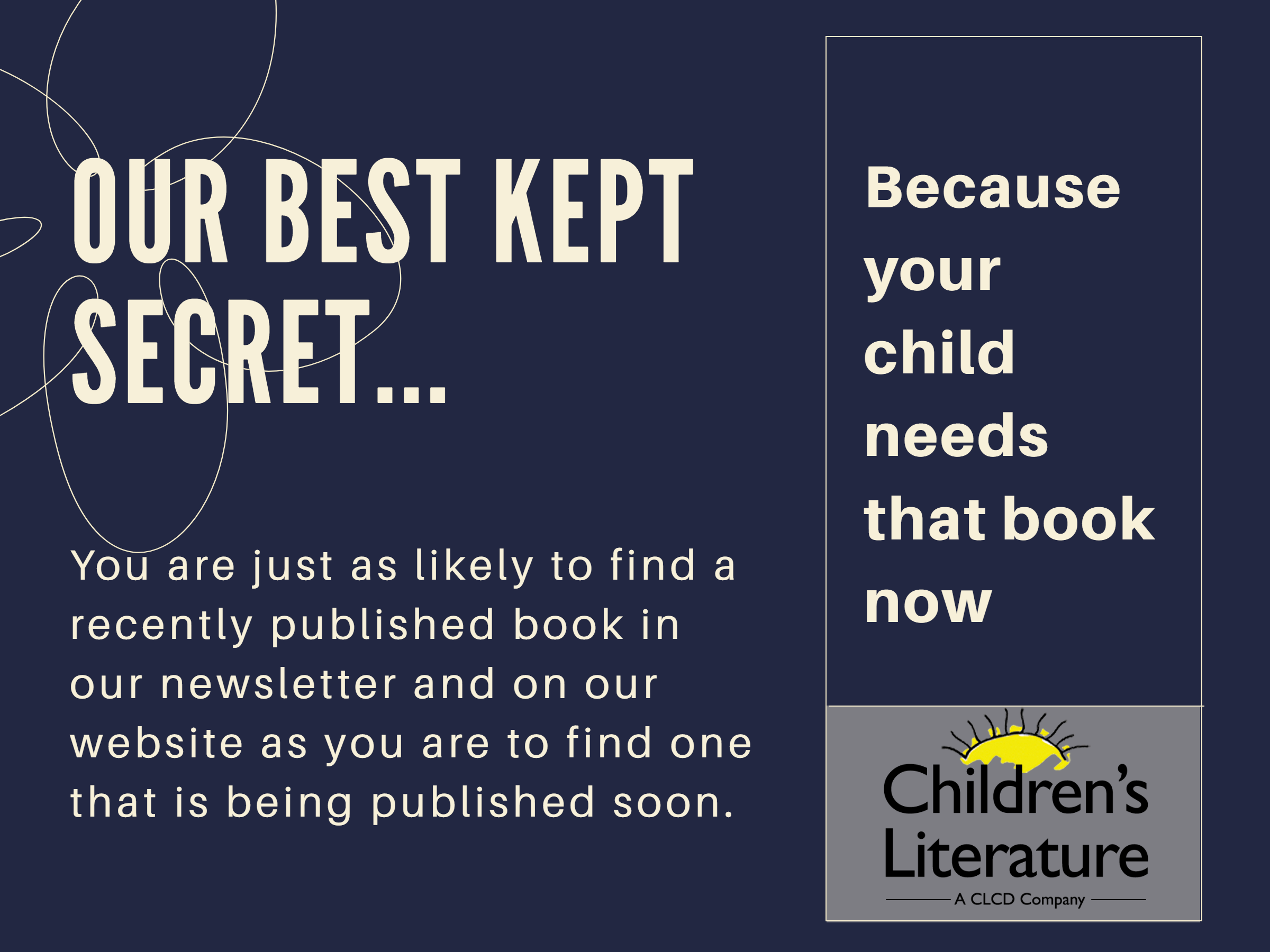
Spring book purchases are key for school libraries preparing for the next school year and public libraries preparing for educational summer programs. While our ChildrensLit Now newsletter provides some of our most notable reviews, our Children's Literature website includes more featured reviews to help you decide on the best collection purchases for your library's needs. Our goal is to provide our readers with a variety of reviews to meet a variety of needs. And that need isn't always about a book that is being published in the next season. You may need a book already published to get placed in your library's stacks to fulfill a need now. To meet both needs, Children's Literature does not require publishers to submit pre-published books months in advance. You are just as likely to find a new book published within the last few months in our newsletter and on our website as you are to find one that is forthcoming. And that's even more valuable to parents who have a child needing a specific topic or genre. We anticipate you'll find a great book in this month's newsletter to fill just the right spot on your shelf.
Subscribe to ChildrensLit Now Newsletter
In case, if you have missed our previous issue.

Take a closer look at fifteen inventions presented here in chronological order. The first to appear is a hand-cranking ice cream freezer, followed by a machine to make paper bags, a dishwasher, the Wright brothers' airplane, George Washington Carver's peanut products, a traffic signal, a video game, computers, a prosthetic leg, a super soaker, the space shuttle, and others, before concluding with stem cell research in 1991. The featured inventors are both male and female and represent a variety of ethnic backgrounds. Each invention is introduced in a colorful full-page illustration. A black page with white type and illustrations is on the reverse side. Shining a flashlight on that page reveals the inside parts of each invention. Brief summaries of eight additional inventors appear on the final two pages. This is a good introduction to the concept of inventions and may spark creative ideas for young readers. An excellent companion to jumpstart thinking before any school's Invention Convention.
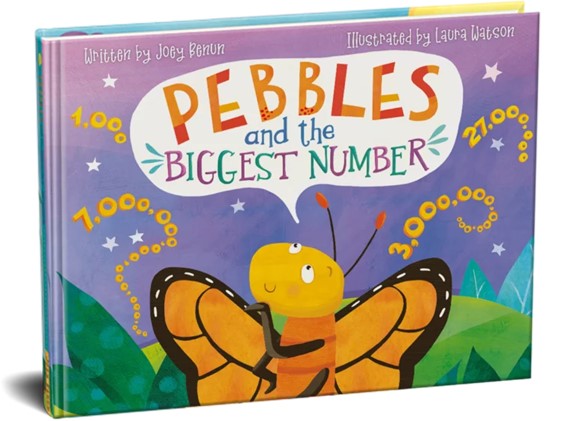
Meet Pebbles, an inquisitive and adventurous Monarch butterfly whose math-minded curiosity prompts an adventure around the world. The story begins with Pebbles engaged in a simple activity young readers might have experienced, too: counting flowers in his garden. Faced with the same small numbers as always—1, 2, 3, 4—Pebbles' mind begins to wander. He knows there must be other, bigger numbers. But what is the biggest of all, he wonders? He decides to find out! First, Pebbles asks a camel in a desert. The biggest number the camel knows is "27 million," which is the sun's temperature. Then, Pebbles heads to the tropical rainforest, where he encounters an eel. The biggest number the eel knows is "1 billion." Next, he asks a tree frog, who knows the number "3 trillion." So it goes, with Pebbles also visiting the forest floor, the beach, the sea, the sky, the snowy mountain, a laboratory, and an observatory and encountering an army of ants, a crab, a dolphin, an eagle, a dog, and a scientist. His final encounter is with a painted lady butterfly, who shares the concept of Infinity! Alongside Pebbles' adventure, each double-page spread is filled with Number Notes (math facts) as well as Science Spots and Did You Knows?. There is such a wealth of added content in the pages of this book that young readers might best read it through the first time focusing just on the story, then dive back in for all of the facts. Watson's digitally created art is appealing and colorful, adding a sense of whimsy to this outlandish-but-glorious globe-spanning trip. Everything about this book deserves a second look—even the endpapers, which feature the various animals Pebbles encounters on his journey! This book is sure to prompt "wondering" moments for young readers and grown-ups alike. Recommended for pre-K through early elementary collections, as well as public and home libraries.
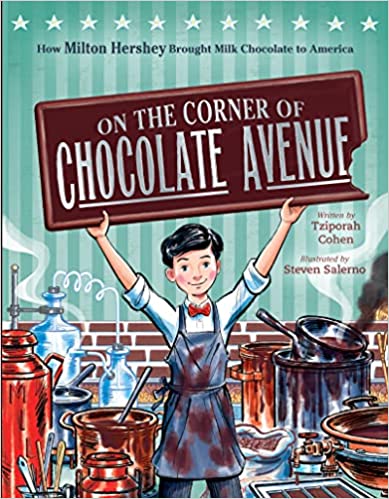
Unwrapping the story of milk chocolate being brought to America by Milton Hershey is as delightful as unwrapping a chocolate bar itself. In this nonfiction biography of Hershey, readers are introduced to a young man who overcomes the limitations of the conditions of his childhood, turns adversities into opportunities, and ultimately achieves sweet successes he shares with others. Determined to provide an accessible alternative to cost-prohibitive imported chocolates of his times, Hershey developed and refined a recipe until it was perfected, building on his knowledge and past experiences to create an irresistible product that spread the joys of chocolate. Combining historical facts with the science of candy-making, Cohen offers readers a fascinating account that will be especially appealing to budding entrepreneurs, makers, and creative thinkers. While not an extensive biography, this is a solid overview that captures Hershey's enterprising spirit, perseverance, and compassionate leadership in giving back to his community. Elementary school students will enjoy learning about the origins of chocolate, along with cultural changes in its consumption around the world, a topic that would make for an excellent social studies or chemistry unit, especially when complemented by hands-on application in practicing confectionary skills. The short narrative text is expanded upon in the backmatter, which includes a timeline of Hershey's life, lists of additional reference sources for both children and adults, and several photos of Hershey throughout his life. New vocabulary words include the names of candy-making machinery; many captions and labels clarify the brightly colored illustrations. The busy, theatrical style of the artwork reflects Hershey's own energy and ambition. Action-packed images of carousels, candies, and celebration are sure to captivate young audiences.
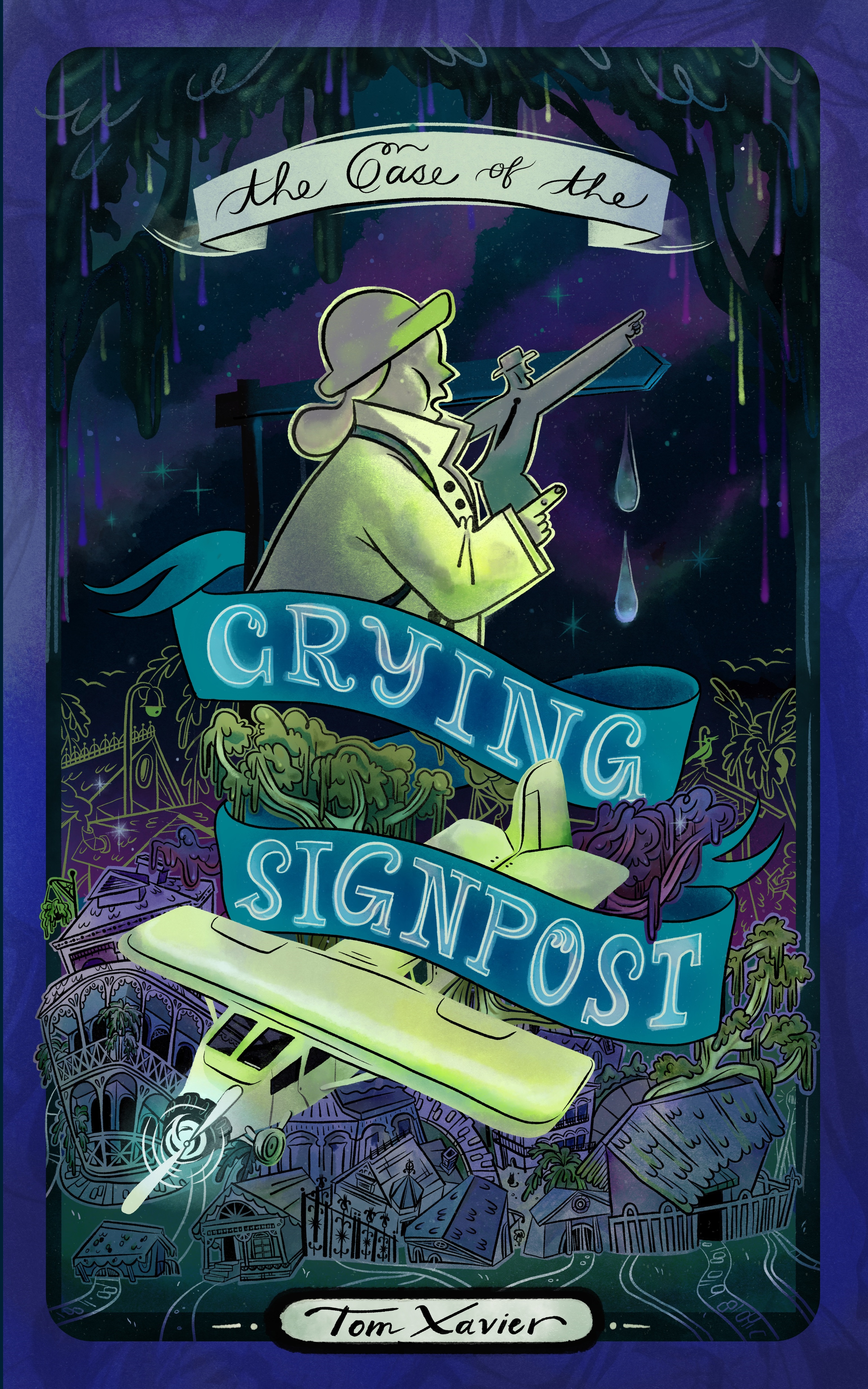
Twelve-year-old Gwendolyn Morgana Melcham—better known as Nelly—shares a story of daring and adventure, intrigue and voodoo, racism, and America in the early twentieth century. The year is 1937. Nelly has received word that she is to join her father, a ship's captain, in Puerto Rico for vacation. The first leg of her journey, from Chicago to Miami by train, goes off without a hitch. Then, while she is waiting for her mother's pilot friend to ready their aircraft, Nelly spies an unusual piece of luggage that leads to a surprising encounter and a most urgent sidebar for her travel. Inside the luggage is six-inch-tall detective Tim Morcombe. In spite of his short stature, Morcombe is a world-renowned detective and has been summoned by the governor of Louisiana to help with an important case. A woman named Millie MacLaren is missing, and it is a matter of life or death! But where is the plane Tim was to meet? With her father delayed a week by damage to his ship, quick-witted Nelly decides she has just enough time to help her new friend and traveling companion get to New Orleans and find the missing person. After a bumpy landing, the pair launch their investigation. Will they be able to solve the case in time? Morcombe's deductive abilities are second to none, and his diminutive stature is an asset in allowing him to observe others without being seen. Nelly is an essential ally for him in navigating New Orleans, asking incisive questions, and sorting out allies from enemies. Xavier's history-infused mystery features an appealing pre-teen lead, a clever detective, and some of the best features of the genre: peril, family secrets, greed, conspiracies, and a satisfying bad-guys-unmasked conclusion. It is a compelling and enjoyable story that readers will be tempted to consume in one sitting. Like Conan Doyle's Sherlock Holmes stories, this is told from the perspective of an engaged—and engaging—detective assistant. Fans of Turnage's "Three Times Lucky" series or LaFever's "Theodosia" series will find Nelly's narratorial voice particularly appealing. Xavier's text does seem to leave open the possibility of a sequel, and readers will be hoping for one.
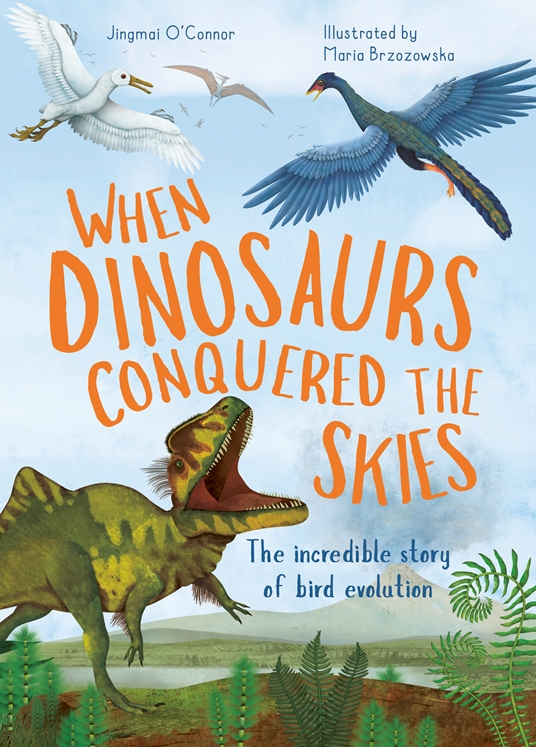
This book has to be one of the most comprehensive collections of dinosaur/bird evolution ever written for this age range. Its pages include explanations of the birds of today, followed by an introduction of fossils, and how and where many can be found. It has been known for a while that birds are dinosaurs, but how did this come about? Birds have feathers, and most can fly. Were there original dinosaurs that did the same? Where were many of the fossil remains of the early dinosaurs/birds found? Are there special places where many diverse animal bones have been collected? And what do they tell us of the structure that allows birds to fly? The author, in just sixty pages, gives readers a good introduction to the evolution of dinosaurs and the many forms that could have become our present-day birds. Includes details about why birds must eat so much more, relatively, than other animals, as well as why females possibly have only one ovary, how some birds can fly as soon as they hatch, and why others are helpless and stay with their parents until fully grown. In addition, the book includes information about how humans appear to be creating a "sixth mass extinction" and some possible ways to stop or slow down this potential crisis. This is not a book that can be read in one sitting; it must be taken slowly, perhaps with a notebook and writing implements. The reader, after finishing it, quite possibly will have a new, and surprising, concept on the lives of birds past and present. For those who love animals, and wish to preserve them, this is good reading.
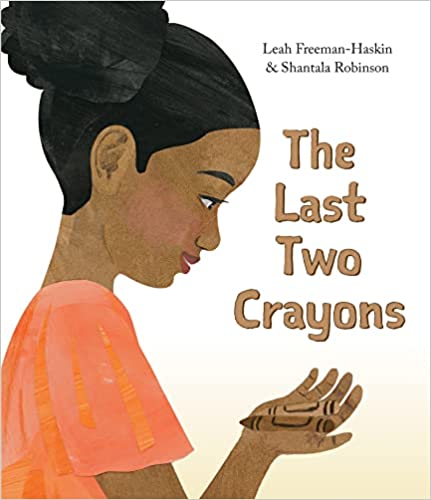
Sienna enjoys art class and all the creations she gets to make with a variety of materials, from paint to paper-mâché. However, a special event is approaching: the spring art show. Ms. Graham presents the class with crayons to draw something beautiful to display to the entire school, and the students choose their colors. By the time Sienna gets to the table, only the light brown and dark brown crayons are left. She's a bit disappointed, and it doesn't help that her classmate Andy starts to tease her for being so slow that she will have to draw mud and dog poop. In fact, from roses to rainbows, nothing Sienna brainstorms will do in brown. With some encouragement from Ms. Graham and the ideas of her classmates, Sienna draws chocolate ice cream in a waffle cone and a grizzly bear climbing the trunk of a tree. The only problem is that Sienna wants to make something extra special for the art show. With only ten minutes left, Sienna hears the rain outside and thinks of a rainy day she spent cozied up with her mom and a cup of hot cocoa. Inspiration strikes as she remembers her mom's words about how beautiful the color brown is. With fresh paper, Sienna draws her family—her mom in a golden brown, her dad in a rich brown, and herself as the perfect mix of both browns. Proudly showing it off to her class, Sienna smiles a beautiful brown smile. The illustrations convey a diverse and inclusive class of students all coming together through the text to think, create, admire, and belong. Told through a relatable art class activity with child-friendly vocabulary, this is a good book to celebrate diversity, coming together, and feeling good about who one is.
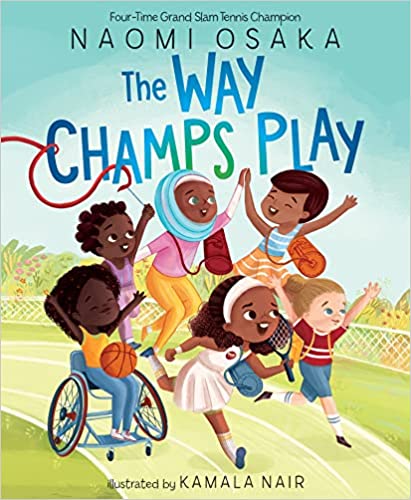
This inspiring story, written by tennis phenom Naomi Osaka, brings her desire for girls everywhere to get out and move through a variety of sports. Through rhythmical storytelling, the message of girl empowerment is achieved. Messages of self-confidence, kindness for others, teamwork, doing your best, and, most of all, having fun is delivered flawlessly. The characters are diverse in their ethnicities and abilities- handicapped-able characters can be seen in wheelchairs playing basketball and being accepted into the larger group of their peers, and a Muslim character wears her hijab proudly while playing soccer and doing yoga. This story checks all the boxes as an inspirational must-read for young girls of all nationalities and ability levels. This story is beautifully illustrated with bright colors and characters who always seem to be having a wonderful time together. The book also addresses failure and the importance of cheering on others and always being kind. Osaka has hit a grand slam with this story that will help young girls not only learn the importance of being active but the bigger lesson of self-love, kindness, and the acceptance of others.
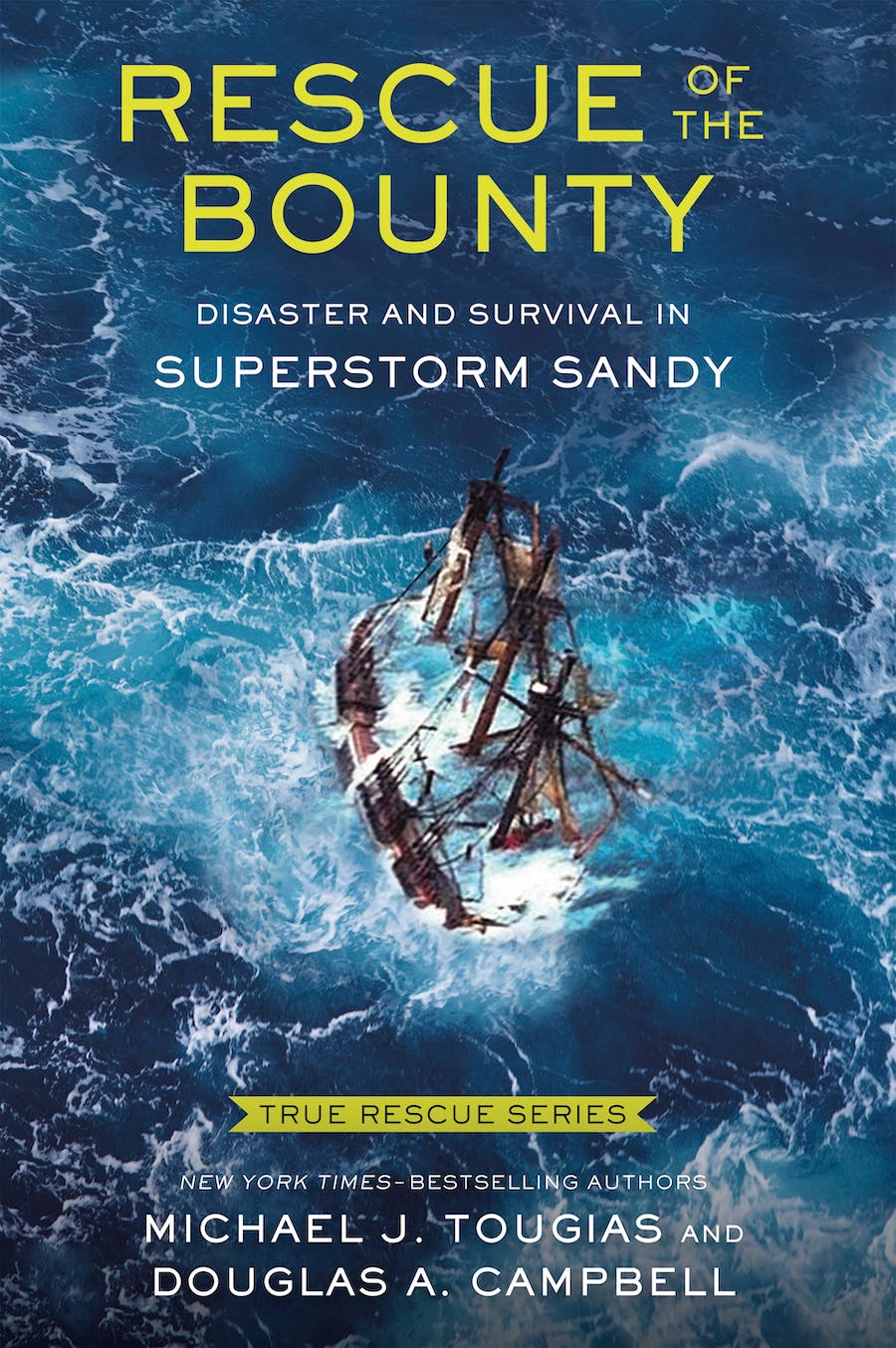
Captain Robin Walbridge is planning to travel south and asks his 15-member crew whether they would like to go with him. There is a storm in the vicinity of his course, and he assures his staff there will be no penalty for their refusing to go. No one refuses, and the 180-foot, 50-year-old wooden ship, a replica of the 18th century Bounty, prepares for its trip to Florida – and right into the course of Hurricane Sandy, one of the more ferocious storms ever to lash the Atlantic Coast. The crew had noticed that the ship had some problems, both mechanical and structural, but the captain believed, as it had outlasted other powerful storms, that it could do the same once again. However, no one could believe the winds and the height and power of the waves once the Bounty found itself in the midst of Sandy's clutches. Within just a short time, the three-masted beauty was thrown around like a softball and quickly broken apart. Fortunately, there was radio ability, and the crew signaled for help, but, in the storm, that help couldn't come to their aid fast enough. Did any crew members survive? What happened to the rescue vehicles? This book reads like an adventure novel, ready to keep you on the edge of your seat, except – it really happened. Whether the reader recalls, or perhaps just heard of, the hurricane that caused incredible devastation in 2012, this book will show the unbelievable heroism of the Coast Guard in going out in weather such as this to rescue people who shouldn't be where they are; yet, many risked their lives to do so. This book takes the reader into the eye of one of the worst storms in history. Join the authors for one of the greatest ocean rescues ever. This is a read you will never forget.
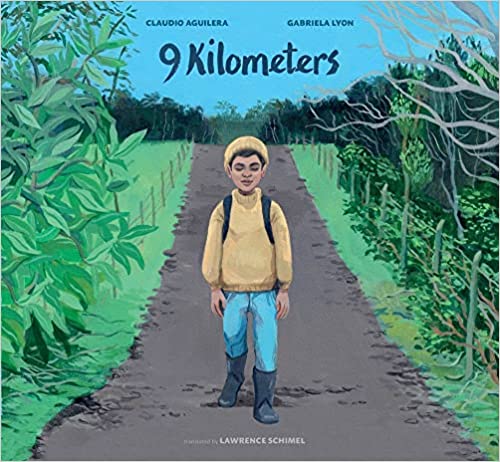
Beautifully painted pictures of southern Chile illustrate the boy's nine-kilometer walk to school every morning. He starts his journey while it is still dark and cold outside. His mother waves goodbye from the front door. As he walks, he tries to count his steps but gets distracted by sounds from the dogs, chucao birds, and grasshoppers. He decides to count butterflies and grasshoppers instead and keeps walking, and walking, and walking. He walks in the dark, in the sun, and even in the rain. In the end, he decides that nine kilometers are almost 15,000 steps, maybe more… but always enough for him to arrive at school. This is a brilliantly written story that helps us understand how many children around the world have to travel very far just to go to school. Aguilera's book ends with eight additional children from different countries that also travel many kilometers to go to school. There are also paintings and facts of eight animals found throughout the book. This book is highly recommended for any classroom or library. 9 Kilometers will spark discussions about the struggles faced by children around the world and the importance of education.
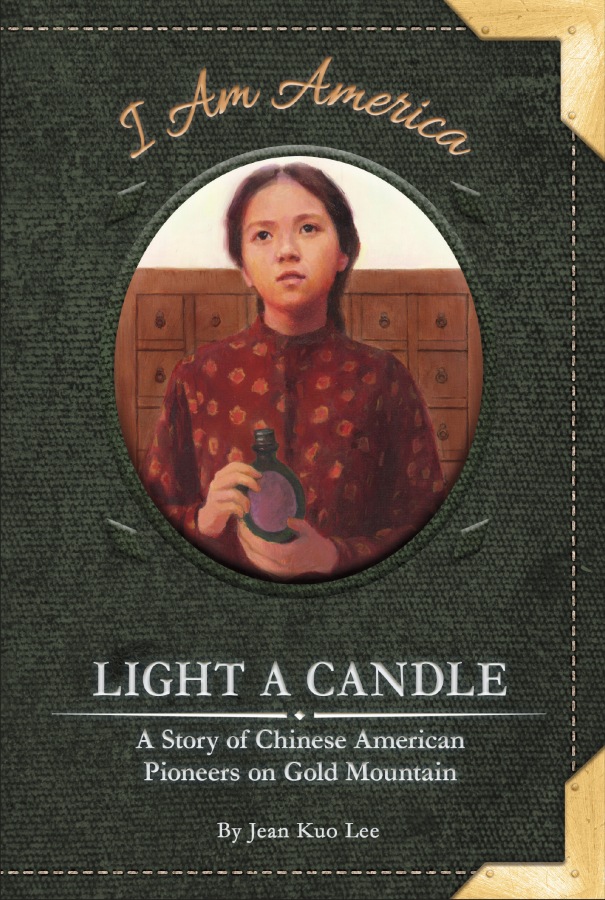
An unsung chapter of Asian American history is depicted in Jolly Fish Press's newest I Am America paperback release. Lee brings us into the fictional world of Emma Fong, a young Californian-born girl of Chinese descent. Dropping middle grade readers right into the drama, readers learn the harsh reality of 1860s America. Emma's family worked hard to be a part of America, building their own business and sending their children to the local school. Despite their best attempts, however, there are many in their small gold rush era town who dislike and mistrust their and other Chinese Americans' presence. Soon, anti-Chinese sentiment affects the Fong family directly, particularly in Emma and her brother's desire to further their education. Eric Freeburg provides beautiful pencil illustrations to enhance the story, bringing warmth to the characters. Similar to the original American Girl series, each I Am America book ends with actual photos of the book's time period and the author's factual notes. Lok Siu, Associate Professor of Ethnic Studies and Asian American and Asian Diaspora Studies at UC Berkley, provided consultation for the book's historical background. Readers drawn to historical fiction will be delighted to read an excerpt from another I Am America book at the back of each book.
Author James Christopher Carroll

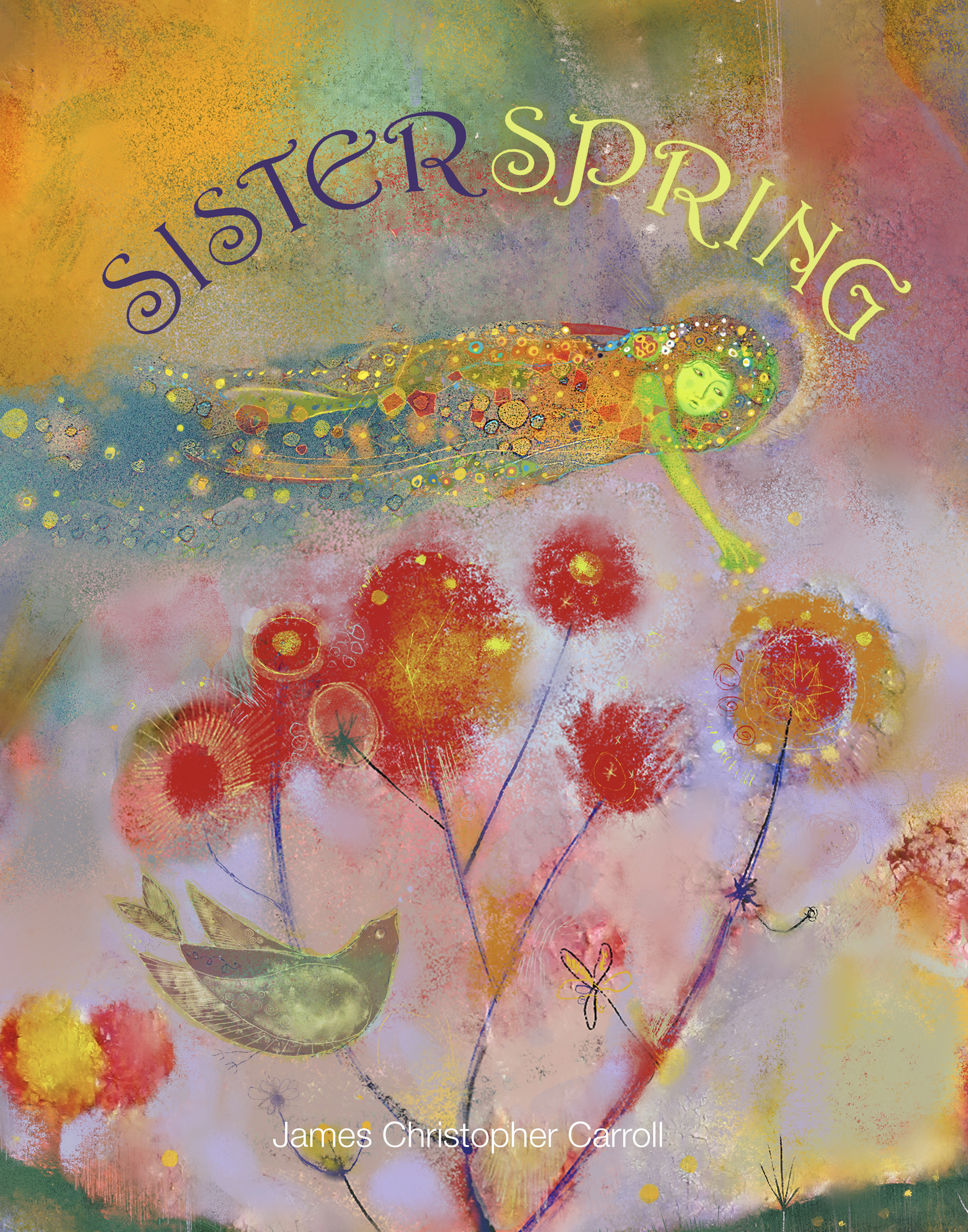
Flowing words and scenes barely begin to summarize James Christopher Carroll's books. The reader enters a dreamlike state, experiencing moments, feelings, and reflection. Whether it is the beauty of a season or the interaction with an animal or object, James' works wrap you in the scene's magic. His upcoming title, Sister Spring, the second book in his reflections on a particular season, takes readers through spring's wonder. We are delighted to bring you our interview with James- how he got started and what inspires him to create beautiful books.
Hi James! Readers have enjoyed your stories and illustrations in picture book form since 2010. Can you tell us about your journey into the world of picture books?
I've always wanted to be an artist. Nothing else made much sense to me. To create vessels that convey the little dramas of life became irresistible, and picture books became an object of desire. They are like theatre –the partnership of imagery and dialogue, on a stage or page, holding hands and walking us through a story.
Which comes first- the illustration or the story?
Usually, an image comes first. I like to have some sort of visual anchor that I refer to as I'm writing. This picture acts as a wellspring for possibilities, narratives, or an atmosphere for the writing. After the text is written, then I'll work on the other illustrations. –Now, the text inspires the images.
As an artist, what colors and mediums are you drawn to?
Honestly, that changes every day.
Tell us a little about how the idea for Mother Winter and Sister Spring came to you.
My dear mother loved a good walk on a snowy winter eve. That's all I needed for "Mother Winter." For "Sister Spring," the simple poetry of fact –we all grow from this earth; this was the seed of inspiration.
For winter and spring, you have created ethereal worlds so true to the feelings of each. Can readers expect summer and autumn worlds in the future?
Oh yes, summer and autumn deserve to be on our calendar! I send a big hug to my friends Rita Marshall and Tom Peterson at The Creative Company for their talents and vision. They publish some of the most beautiful books in the world, and I am blessed to be part of this group.
On your website, https://jameschristophercarroll.org/, you share your poetry as well. Have you always been a poet?
Writing had always been a chore. For much of my life, I would have preferred a world without the responsibility and encumbrances of language. A lovely sentence seemed the currency of a rarified few, and I had no business pretending. But as it turns out, "pretending" is the key; it opens the door. So, I pretended. I pretended that I could write. Every day I would pretend –for quite some time; until little by little, the words felt sorry for me and gave up some of their secrets.
If I have any sort of aptitude for these types of endeavors, it comes in the shape of persistence. If you could see my sketchbooks you might conclude that I am an enthusiastic mess of ideas. An adjunct professor of mistakes. A big pile of unmoored hope. But I believe this realm of confusion is where creativity grows proper fruit.
Besides writing and art, what other talents or hobbies do you have?
I'd love to claim that I can dance and sing; or that I rehabilitate chinchillas and speak with owls –but that is just silliness. But give me a day in the woods, on skis or a mountain bike –there's some truth to that.
Who is an artist you admire and why?
Joan Miro, Paul Klee, Marc Chagall, Pablo Picasso, Odilon Redon, Etienne Delessert, Seymour Chwast, Maurice Sendak, Gabriel Garcia Marquez, Walt Whitman, Edna St Vincent Millay, Maya Angelou, and Mary Oliver - because they inspire such delightful possibilities.
James' latest book, Sister Spring, is published by Creative Editions, an imprint of The Creative Company.
Created by Hiawatha Smith, assistant professor of literacy education, University of Wisconsin- River Falls
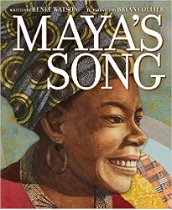
Before Reading Options:
· Show the cover and have students share ideas. Who is this? What do they know about "Maya."
· Write the name Marguerite Annie Johnson on the board. Have students brainstorm who this is and why this person might be important.
· Present a video clip of Maya reciting a poem, preference for the inauguration clip.
· Share a poem by Maya Angelou (words and audio) to allow students to notice and wonder here.
During Reading Questions:
· Poem Too Grand for his Own Skin. How does the illustration show confidence for Bailey Sr?
· What places did Maya live?
· Where did the name Maya come from?
· What challenges did Maya experience?
· How was Maya's childhood similar to or different than your own?
· Who were some important people in Maya's life? Why were they important?
· Maya's silence was due to her feelings about what had happened to her mother's boyfriend. How long was Maya silent? If in her shoes, would you have gone silent too? What tool was able to break Maya's silence?
· Maya is known for her poetry. However, she had many other experiences that allowed her to influence people. Identify these and the influence they had on people.
· Who were some of the influential people Maya was associated with? How do you think this impacted MAYA's life?
· Take a look at the timeline at the back of the book. Identify THREE questions you have while looking at the details.
After Reading Activity: Have students complete a graphic organizer (this can be done while reading if you break the text into parts). A teacher can modify the three sections in any way they see fit, replicating for more details, or adding additional prompts.
|
Biography Analysis |
|
|
Person: |
Maya Angelou |
|
Identify 1 salient detail about Maya's life. How did this detail impact Maya? How would it have impacted you? |
|
|
|
|
|
Identify 1 influential person in Maya's life. How did this person impact her life? |
|
|
|
|
★ Children's Literature reviewers are a mix of librarians, educators, authors, and others who work with children and teens or children's and YA literature. We continue to secure reviewers with unique experiences and skills, and this month we are recruiting higher education English and literature professors. If you teach children's or young adult literature courses and are interested in becoming a volunteer reviewer, please visit https://www.childrenslit.com/becomeareviewer to sign up.
★Are you an author of a children's or YA book? Children's Literature reviews self-published and hybrid-published books through our Indie Author Promotion Service. Learn more at https://www.childrenslit.com/indie-authors.
★ Children's Literature Comprehensive Database and MoBoo, a reading recommendation app, contain all of Children's Literature's book reviews. Visit www.clcd.com for information about Children's Literature Comprehensive Database and www.moboo.com for information about MoBoo.
★ Advertise with us! The ChildrensLit Now newsletter now offers advertising spots to promote books and book events. Contact marketing@childrenslit.com for complete details. Put "Advertise ChildrensLit" in the email subject line.